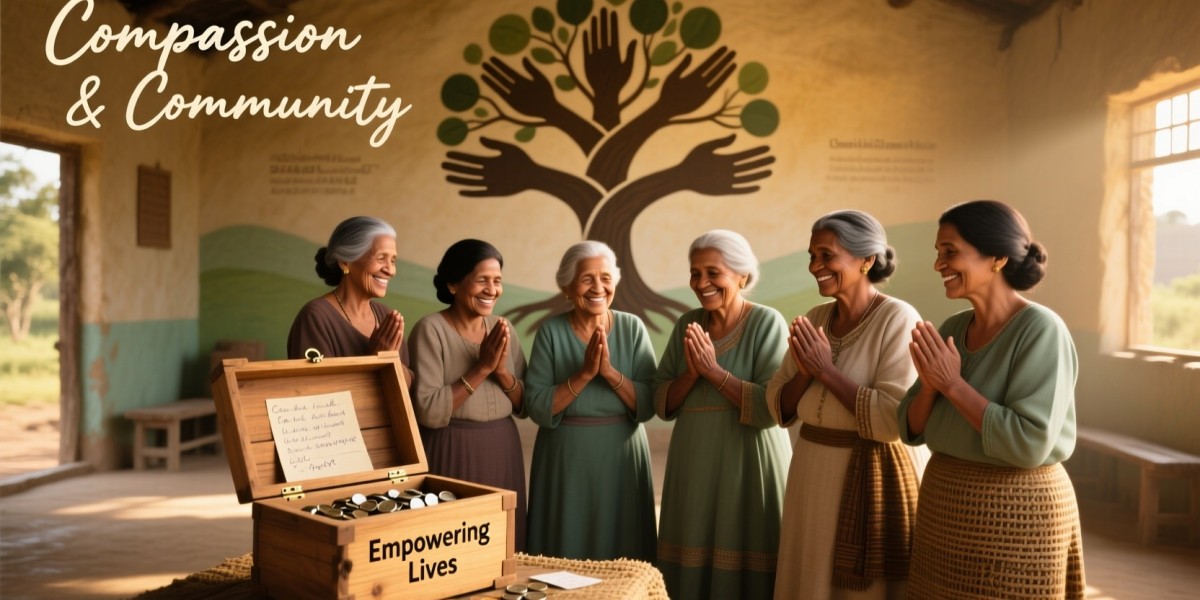When a woman loses her spouse, her life changes instantly in both emotional and practical ways. Beyond the personal grief, widows often face financial hardship, social isolation, and uncertain futures for themselves and their children. In many communities, especially in developing regions, widows may be left without sufficient income, housing, or access to education and healthcare.
This lack of support can trap them in cycles of poverty and emotional distress. Donation support for widows is not just about money—it is about restoring dignity, stability, and hope. Every contribution, whether large or small, creates ripples of positive change that transform individual lives and entire communities.
Widows are often among the most vulnerable members of society because traditional family structures and inheritance laws may not protect them. In some cultures, widows are denied property rights or excluded from family wealth. Without proper legal backing or social security, they are left to fend for themselves.
Donation initiatives are vital because they fill this gap, offering immediate relief and long-term empowerment. The goal is not charity in the shallow sense, but social justice—ensuring that no woman’s life collapses simply because her husband has passed away.
How Donations Make a Real Difference
Every donation directed toward widow support programs serves a purpose that extends far beyond financial value. When you give to organizations that help widows, your contribution might fund vocational training, small business grants, educational scholarships for children, or even simple necessities like food, shelter, and medical care. This kind of targeted aid transforms despair into potential.
For example, a small donation can help fund sewing machines, cooking equipment, or computer training classes that let widows start home-based businesses. This approach combines immediate relief with long-term sustainability. Rather than relying solely on ongoing aid, widows gain the tools to rebuild their independence. This empowerment model aligns with the principle of “helping people to help themselves.”
Donations also support counseling and emotional well-being programs, which are often overlooked but deeply necessary. Losing a spouse involves complex grief that, if left unaddressed, can become debilitating.
Social workers and psychologists play a critical role in helping widows rediscover self-worth and confidence. When combined with financial stability, this holistic approach allows them to step back into life with renewed strength.
Building Sustainable Widow Empowerment Programs
Effective donation programs are those that evolve beyond emergency relief. While immediate assistance—such as food, healthcare, or temporary shelters—is essential, long-term empowerment is equally important. Sustainable programs invest in education, skills development, and financial literacy. When widows acquire new skills or educational qualifications, they gain the power to create better futures for themselves and their children.
Many successful initiatives adopt a community-based model where widows form cooperatives or self-help groups. Collectively, they can apply for microloans, establish shared businesses, and provide emotional support to one another. Donations that fund these initiatives do more than assist individuals; they cultivate networks of empowerment. These networks generate local leadership and encourage widows to become advocates for others.
Technology is also expanding the reach of donation programs. Online crowdfunding platforms and transparent digital ledgers make it easier for donors to track how their money is used. This builds trust, increases participation, and ensures every contribution truly reaches those in need. The digital era has made it possible for even small donors to make a tangible difference across the globe.
The Role of Communities and Organizations
While individual donations matter, strong community systems and nonprofit organizations are the backbone of widow support. Local NGOs, faith-based charities, and international development agencies collaborate to identify widows in need and design tailored programs. Community engagement ensures that the help provided is culturally respectful and relevant to each woman’s circumstances.
In some areas, religious or community leaders play a key role in reducing stigma and promoting inclusion. When widows are welcomed into social and economic activities, entire families benefit. Moreover, when donors partner with verified organizations, they amplify their impact. For example, joint donation drives can fund sustainable initiatives such as housing projects or women's cooperatives that create ongoing employment.
Governments also have a role to play by creating legal frameworks that protect widows’ property rights and guarantee access to public welfare schemes. When private donations combine with public policy, positive social change accelerates. The synergistic cooperation of donors, nonprofits, and governments can rewrite the narrative for widows from one of loss to one of resilience.
Why Supporting Widows Benefits Society as a Whole
When widows are supported, societies grow stronger. Empowering a widow means feeding a family, educating children, and nurturing small economies. The economic and social return on such donations is far greater than the initial investment. A stable widow often becomes a community pillar, mentoring others who face similar hardships.
Ignoring widows’ needs, on the other hand, weakens communities. Children of unsupported widows may drop out of school or face malnutrition, perpetuating cycles of poverty. But when donations fund education programs and vocational opportunities, new doors of possibility open. The collective benefit multiplies because each empowered widow contributes positively to her community's social and economic fabric.
Supporting widows is not an act of pity—it is an act of partnership with women who are determined to stand strong again. In many inspiring stories, widows who once received aid later become donors themselves, completing the cycle of kindness. Such transformations prove that compassion backed by organized support can truly change lives.
FAQs
- How can I donate to widows safely?
Choose reputable organizations or verified online platforms that clearly show how donations are used. Look for transparency reports and registered charity numbers. Avoid sharing personal information outside secure payment systems. - What types of donations are most helpful?
Both financial and material contributions help. Money gives flexibility to cover pressing needs like food, education, or healthcare. Material support, such as clothing, business tools, or skill-training materials, can also be life-changing. - Can small donations really make a difference?
Absolutely. Even small amounts, when combined with others, can fund essential projects like microloans or vocational training sessions. What seems little to one person can be transformative for another. - Are donation programs only for widows in poverty?
Mostly, aid focuses on widows in financial distress, but many programs also include widows needing emotional or educational support regardless of income. Empowerment programs are inclusive, recognizing that every widow’s journey is unique. - How can I raise awareness about widow support?
Use social media, community events, church activities, or school campaigns to spread awareness. Sharing authentic stories of resilience helps attract more donors and partners who want to contribute.



